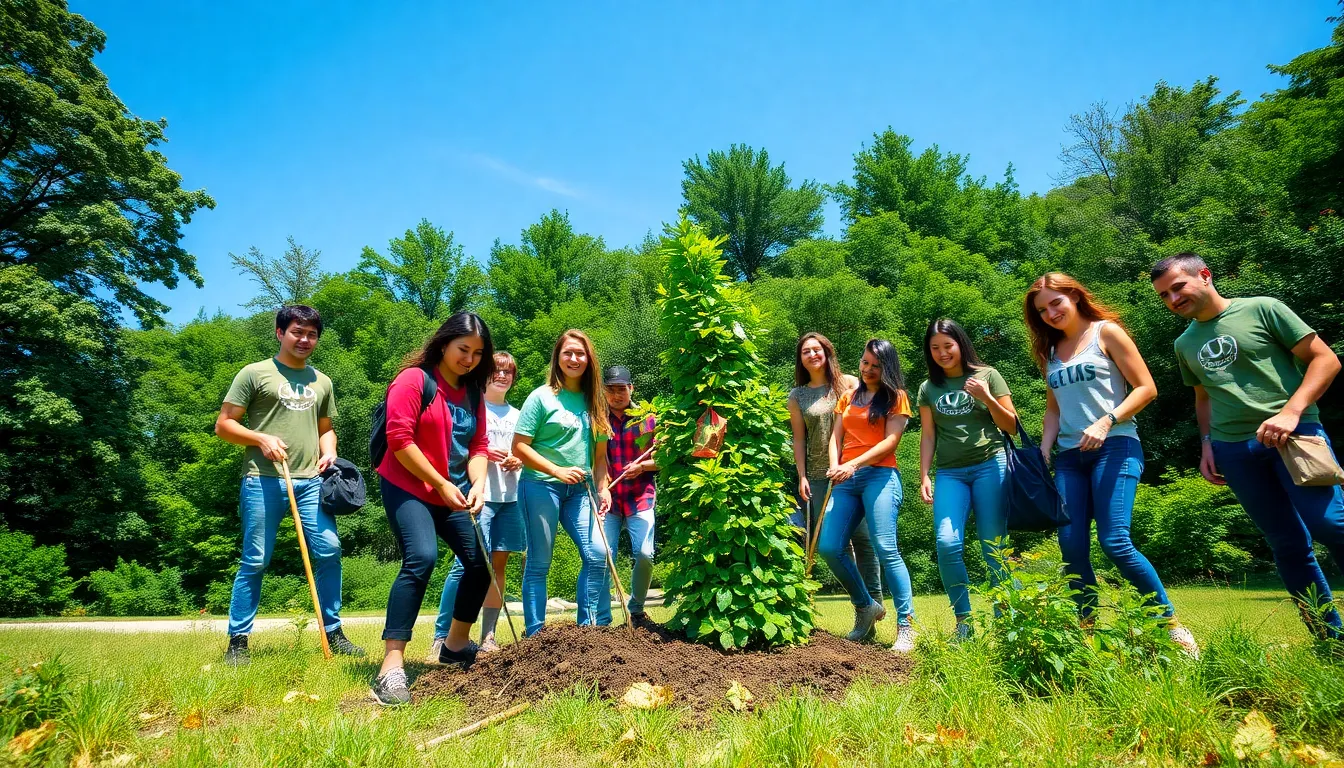Table of Contents
ToggleTraveling the world is a dream for many, but what if that dream could come without a hefty carbon footprint? Enter sustainable tourism, the superhero of the travel industry, swooping in to save the planet one eco-friendly adventure at a time. It’s not just about hugging trees or sipping organic smoothies (though those are great perks); it’s about making choices that protect the places we love to visit.
Imagine exploring pristine beaches, vibrant cultures, and breathtaking landscapes while knowing you’re leaving them just as beautiful for future generations. Sustainable tourism isn’t just a trend; it’s a movement that invites everyone to be a part of the solution. So grab your reusable water bottle and let’s dive into how travelers can enjoy their adventures guilt-free, all while keeping Mother Earth smiling.
Understanding Sustainable Tourism
Sustainable tourism focuses on responsible travel practices that protect the environment and preserve cultural heritage. This approach promotes an enjoyable travel experience while ensuring long-term benefits for local communities and ecosystems.
Definition of Sustainable Tourism
Sustainable tourism refers to travel that meets the needs of present travelers without compromising the ability of future generations to meet their own needs. Responsible consumption, environmental conservation, and respect for local cultures define its core principles. Travelers engage in activities that support the preservation of natural resources and foster economic opportunities for local communities. It emphasizes minimizing waste and reducing carbon footprints through conscious travel decisions.
Importance of Sustainable Tourism
Sustainable tourism plays a crucial role in combating climate change and protecting natural habitats. It encourages travelers to make mindful choices that contribute to the well-being of destinations. Understanding the local culture enhances community relationships and ensures tourism benefits everyone involved. Economic support for local businesses and services boosts livelihoods and helps maintain local traditions. Promoting awareness of environmental issues allows tourists to appreciate and protect the natural beauty of the places they visit.
Principles of Sustainable Tourism

Sustainable tourism encompasses practices that aim to protect and preserve the environment while respecting local communities. Each principle contributes to a holistic approach that ensures travel benefits both visitors and destinations.
Environmental Preservation
Environmental preservation focuses on protecting natural resources and biodiversity. By minimizing waste and reducing carbon footprints, travelers can enjoy destinations without causing harm. Responsible practices include choosing eco-friendly accommodations, participating in conservation activities, and respecting wildlife habitats. Engaging in sustainable transportation options, such as biking or walking, also promotes environmental stewardship. Educating oneself about local ecosystems enhances appreciation and encourages visitors to advocate for their protection.
Socio-Cultural Integrity
Socio-cultural integrity emphasizes respect for local cultures and traditions. Travelers can immerse themselves in authentic experiences by learning about customs and norms. Supporting local artisans and participating in cultural events fosters community connections. Visitors should strive to engage with residents, ensuring their presence benefits the community economically. Preserving local language, practices, and rituals contributes to cultural diversity. Promoting cultural sensitivity enhances relationships between tourists and locals while enriching the travel experience.
Economic Viability
Economic viability ensures that tourism contributes positively to local economies. Prioritizing local businesses encourages prosperity in host communities. Spending on locally sourced food, craft markets, and services strengthens economic resilience. Investing in community-led tourism initiatives creates long-term benefits for residents. Sustainable tourism often generates employment opportunities, empowering locals. Fostering partnerships between tourists and community members enhances mutual support and promotes economic growth.
Benefits of Sustainable Tourism
Sustainable tourism offers numerous advantages that extend beyond individual travelers, impacting local communities and ecosystems positively.
Positive Impact on Local Communities
Travelers support local economies by prioritizing local businesses over large corporations. Buying handmade crafts and dining at family-owned restaurants fosters community engagement. Increased revenue from sustainable tourism can enhance infrastructure, such as schools and healthcare facilities. Local employment opportunities often arise, reducing poverty levels and improving quality of life. Integrating local traditions into tourism experiences helps preserve cultural identity and empower residents.
Enhancement of Natural Resources
Sustainable tourism promotes the protection of natural habitats and biodiversity. Travelers can encourage conservation efforts by visiting eco-friendly lodges that prioritize environmental stewardship. Partnerships with local organizations often raise awareness about ecosystem preservation. In addition, sustainable practices help maintain natural resources, ensuring that future visitors can enjoy pristine landscapes. Environmental initiatives funded by tourism revenue can restore damaged ecosystems over time. Overall, this focus on conservation enhances the natural beauty and ecological balance of destinations.
Promotion of Cultural Heritage
Respecting and celebrating local cultures is fundamental to sustainable tourism. Engaging with indigenous communities allows for authentic cultural exchanges that benefit both travelers and residents. Support for traditional art forms and handicrafts helps preserve unique cultural practices. Travelers gain insights into local customs, enriching their experiences and fostering appreciation for diversity. Culturally sensitive tourism encourages sustainable practices, ensuring that cultural heritage remains intact for future generations. Ultimately, promoting cultural heritage adds value to travel experiences, creating lasting connections between visitors and local communities.
Challenges Facing Sustainable Tourism
Sustainable tourism faces several significant challenges that hinder its effectiveness and growth.
Over-Tourism and its Effects
Over-tourism results from excessive visitors overwhelming popular destinations. Destinations like Venice and Barcelona struggle with overcrowding that degrades local infrastructure, strains natural resources, and diminishes visitor experiences. Economic benefits often favor short-term gains, leaving local communities overwhelmed and negatively impacted. As travelers flock to these areas, local cultures and traditions may erode, impacting the authenticity of the destination. Sustainable practices must address over-tourism through strategies like visitor limits or promoting lesser-known locales, ensuring a balanced approach to tourism.
Climate Change Impacts
Climate change poses a substantial threat to many travel destinations. Rising sea levels and extreme weather events can disrupt tourism-dependent economies and harm ecosystems. For instance, coral reefs, vital for marine tourism, face bleaching due to rising ocean temperatures, directly affecting biodiversity and appealing activities. Carbon emissions from travel contribute heavily to climate issues, necessitating sustainable solutions like eco-friendly transportation options and conservation initiatives. Implementing practices that reduce carbon footprints can help preserve natural attractions, ensuring they remain viable for future generations.
Policy and Regulation Issues
Policy and regulation issues frequently impede the advancement of sustainable tourism. Lack of cohesive regulations often leads to inconsistent practices across regions, causing mismanagement of natural resources and cultural heritage. Governments may prioritize economic growth over environmental sustainability, creating challenges for conservation efforts. Local stakeholders need stronger policies that support sustainable practices and ensure responsible tourism development. Collaborative efforts between governments, businesses, and communities can lead to effective regulations that promote sustainable tourism and protect destinations for future visitors.
Future of Sustainable Tourism
Sustainable tourism continues evolving to meet environmental challenges. Innovations play a significant role in enhancing responsible travel practices.
Innovations in Sustainable Practices
Emerging solutions focus on minimizing ecological footprints. Eco-friendly accommodations gain popularity, with more hotels implementing green certifications. Increased demand for sustainable transportation options, such as electric buses and bike rentals, reflects the changing preferences of travelers. Local initiatives, like community-supported agriculture programs, also enhance food security while promoting local produce. Travelers now prioritize experiences that preserve cultural heritage, encouraging businesses to adopt sustainable practices that foster genuine connections with the environment and communities.
Role of Technology
Technology enhances sustainable tourism significantly. Apps that provide carbon footprint calculations enable travelers to make informed choices about their environmental impact. Advanced booking platforms, which emphasize eco-friendly options, make sustainable travel more accessible. Smart technologies in transportation help optimize routes, reducing energy consumption while improving efficiency. Virtual reality experiences allow potential visitors to explore destinations from home, minimizing physical travel and its associated environmental effects. Additionally, tracking systems for wildlife and natural resources promote conservation efforts by ensuring protection and respect for local ecosystems.
Sustainable tourism represents a vital shift in how people explore the world. By prioritizing responsible travel practices, individuals can enjoy enriching experiences while safeguarding the environment and local cultures. This movement not only enhances travelers’ journeys but also supports communities and ecosystems.
As the demand for sustainable options grows, it’s essential for travelers to make informed choices that align with these principles. Embracing sustainable tourism ensures that future generations can enjoy the beauty and diversity of our planet. Together, travelers can contribute to a more sustainable future, fostering a deeper connection with the places they visit.







